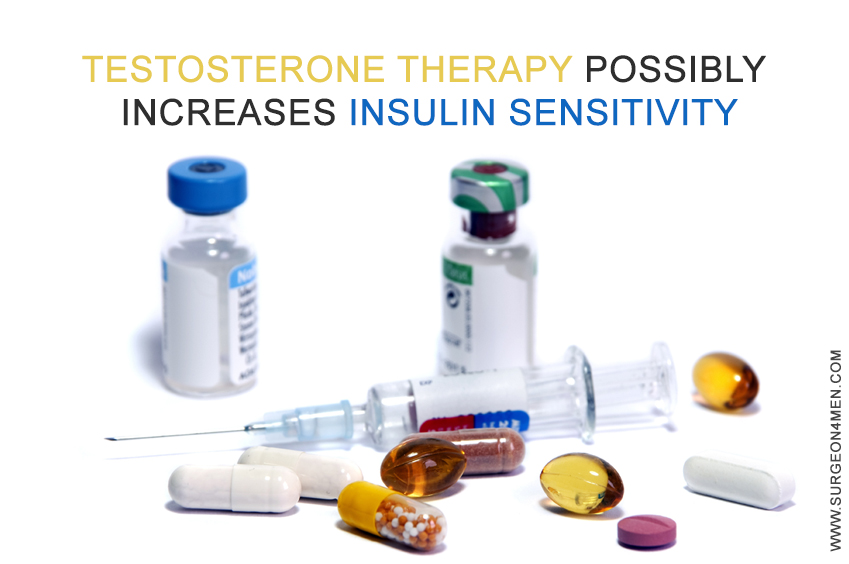Testosterone Therapy Possibly Increases Insulin Sensitivity
Low testosterone levels in men are linked with insulin resistance or reduced insulin sensitivity. What does this mean? Men with type 2 diabetes are two times as likely to have low testosterone levels than men without diabetes. The two conditions are correlated, but this does not mean that low testosterone causes diabetes or vice versa.
Testosterone is a hormone produced in the testicles, which helps maintain men’s bone density, fat distribution, muscles strength, body hair, sex drive, red blood cell production, and sperm production. Testosterone levels peak during adolescence and early adulthood. The levels begin to decline slightly as a man ages. Low testosterone affects sexual function, bone and muscle health, and sexual function.
Insulin is secreted by the pancreas and reduces sugar in the blood stream. Patients with diabetes do not produce enough insulin. Insulin resistance means that cells that are supposed to convert glucose into energy ignore the insulin produced.
 Researchers have found that testosterone therapy improved insulin sensitivity in men. Results concluded that type 2 diabetic men saw a 25% increase in insulin sensitivity after taking testosterone injections for 6 months, compared with no change in men who did not take testosterone injections. Testosterone therapy is available in several forms – skin patches, gels, mouth patches, or injections.
Researchers have found that testosterone therapy improved insulin sensitivity in men. Results concluded that type 2 diabetic men saw a 25% increase in insulin sensitivity after taking testosterone injections for 6 months, compared with no change in men who did not take testosterone injections. Testosterone therapy is available in several forms – skin patches, gels, mouth patches, or injections.
“Our studies have shown that having low testosterone also impacts insulin action, and that can be corrected by testosterone replacement,” said study lead author Paresh Dandona, DPhil, distinguished professor and chief of endocrinology at the State University of New York at Buffalo. “Testosterone replacement increases efficiency of insulin action in men with type 2 diabetes.”
Diabetes And Cardiovascular Disease
Diabetes (a direct effect of low insulin sensitivity) and obesity (which is the most common cause of insulin resistance) are major risk factors for cardiovascular disease. Men with high levels of testosterone have been shown to have a lower risk of cardiovascular mortality. Testosterone therapy has also been associated with an increase in muscle mass and decrease in fat tissue.
Studies suggest that low testosterone levels may be a contributing factor to insulin resistance, which can lead to diabetes. Overall, as men age, they gain fat mass and lose testosterone, putting them at higher risk for insulin resistance.
First relatives of type 2 diabetic patients are at a higher risk of developing diabetes. Though further testing is needed, testosterone therapy may be a viable way to help men control their insulin levels and minimize the effect diabetes has on their every day life or help control obesity.

